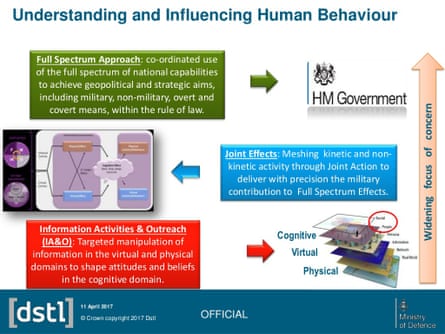The British military is recruiting philosophers, psychologists and theologians to research new methods of psychological warfare and behavioural manipulation, leaked documents show.
Cambridge University was among the institutions shortlisted by officials in the Ministry of Defence’s Defence Science and Technology Laboratory (DSTL), as it sought a partner to spend almost £70m in funding for a project known as the human and social sciences research capability (HSSRC), looking at how the arts, humanities and social sciences can shape military and security strategies, including “psychological operations”.
A spokesperson for the university said it had since pulled out. Others in the running were Lancaster University – which also subsequently dropped out – and the arms companies BAE Systems and QinetiQ.
In a slideshow to prospective contractors published online, DSTL listed “understanding and influencing human behaviour” among its list of research priorities, including through the “targeted manipulation of information” and “coordinated use of the full spectrum of national capabilities … including military, non-military, overt and covert”.

According to leaked Cambridge University documents detailing the research areas included under the programme and first reported by student newspaper Varsity, the military wants to develop “information activities and outreach, defence engagement and strategic communications” alongside military campaigns, as well as “communications and messaging [to] UK domestic and defence internal audiences that promote the attraction, health, welfare and resilience of our people (military and civilian)”.
This research would include “the testing, refinement and validation of workable concepts, tools, techniques and methods to enable analysis of audiences to inform planning of appropriate activities, synchronised delivery of these activities [and] measurement of their effectiveness”, the document said.
A spokesperson for DSTL said its research into “targeted manipulation of information” was focused on “communicating with overseas audiences and deterring adversaries who threaten the UK’s interests”. The research was intended to tailor military communications to key audiences in the most appropriate way, the spokesperson said, adding: “All DSTL research complies with ethical and legal requirements.”
For their HSSRC bid, Cambridge dons proposed a partnership with the national security consultancy Frazer-Nash to set up a research centre, initially within the university’s centre for research in the arts, social sciences and humanities (CRASSH). Within 12 months, it was to be spun out into an independent research facility within the university, called the Centre for Strategic Futures, “with the longer-term aim to explore the potential for this to be spun out as [a] profit-generating programme management consultancy”.
Funded with an initial £6.9m over four years, the centre would help the MoD decide where to spend its money, “including administering open competitive calls for research funding”. University administrators expected that not only would the core funding “provide a significant surplus” but a further £20m would pay for research by its own academics.
Forming the partnership with Frazer-Nash, “which has the highest levels of security clearance”, would give Cambridge access to the defence industry, as well as the framework to handle “projects up to the security level of ‘secret’.” The documents suggested the university has existing relationships with the MoD, DSTL and Frazer-Nash, but the natures of these were not made clear.
Dozens of academics at Cambridge were listed as engaged with the bid, including specialists in disciplines such as architecture, psychiatry, neuroscience and sociology. The project would have been led by Prof Steven Connor, the director of CRASSH.
Cambridge’s general board of the faculties approved the bid for the funding in June 2018, after a presentation by the university’s pro-vice chancellor for research, on a pitch written by Dr Peter Hedges, the head of the university’s research office. Board members were told Cambridge had been criticised for not seizing similar opportunities in the past. Taking this opportunity would, they heard, given them a chance to influence defence research and policymakers.
Heads of the schools potentially involved in the project were supportive, the documents suggested, particularly since many represented areas that typically struggle to obtain research funding. Arts and humanities in particular do not often benefit from big pots of research investment.
A spokesperson for Cambridge said the university was no longer bidding for the HSSRC contract, but was not able to give details as to why it had decided to pull out at such a late stage. Simon Schaffer, a professor of the history and philosophy of science at Cambridge, said he welcomed the withdrawal but was concerned it had not been more widely discussed at the university.
Schaffer was particularly concerned by the suggestion in the documents that “reputational risks” posed by the university’s collaboration with the MoD would have been mitigated by a communications campaign paid for by the HSSRC funding.
“Now I don’t want to be too academic about this, but it’s very striking that a programme designed to change people’s views and opinions for military purposes would spend some of its money changing people’s views and opinions, so that they wouldn’t object to changing people’s views and opinions. See what they did there? Propaganda squared, and that seems wrong,” he said.
DSTL said no PR budget was included in the funding available for HSSRC.
